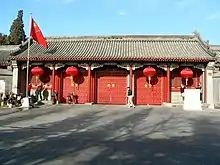State Administration for Religious Affairs
The National Religious Affairs Administration (NRAA), formerly the State Administration for Religious Affairs (SARA), is an external name of the United Front Work Department of the Chinese Communist Party (CCP). Formerly, it was an executive agency directly under the State Council of the People's Republic of China which oversaw religious affairs in the country. SARA was merged into the UFWD in 2018.[1][2] The names of the former agency were retained by the UFWD as external names under the system called "one institution with two names".[3]
| 国家宗教事务局 | |
Old Logo of the NRAA | |
 | |
| Department overview | |
|---|---|
| Jurisdiction | China |
| Status | External name of the United Front Work Department State Administration of the State Council (historical) |
| Headquarters | Prince Chun Mansion, 44 Houhai Beiyan, Xicheng District, Beijing |
| Department executive |
|
| Parent department | United Front Work Department |
| Website | www |
| State Administration for Religious Affairs | |||||||
|---|---|---|---|---|---|---|---|
| Traditional Chinese | 國家宗教事務局 | ||||||
| Simplified Chinese | 国家宗教事务局 | ||||||
| |||||||
History
Originally created in 1951 as the Religious Affairs Bureau, SARA was closely connected with the United Front Work Department and charged with overseeing the operations of China's five officially sanctioned religious organizations:
- Buddhist Association of China
- Chinese Taoist Association
- Islamic Association of China
- Three-Self Patriotic Movement (Protestant)
- Catholic Patriotic Association
The State Administration for Religious Affairs was established to exercise control over religious appointments, the selection of clergy, and the interpretation of religious doctrine. SARA was also meant to ensure that the registered religious organizations support and carry out the policy priorities of the CCP.[4] For instance, SARA has maintained a "living Buddha database" to track prominent Tibetan Buddhists who are loyal to the CCP.[5][6]
Ye Xiaowen directed the SARA from 1995 to 2009. During his tenure, he issued the State Religious Affairs Bureau Order No. 5, which furthered state control over reincarnations in Tibetan Buddhism, and attempted to suppress underground Catholics loyal to Rome (which he considered "colonial") and not to the government-sanctioned Catholic Patriotic Association.[7] After Ye was promoted to the Secretary of the CCP Committee at the Central Institute of Socialism, the former Deputy Director Wang Zuo'an was promoted to Director.[8] Under the Xi Jinping administration, it was announced in 2018 that NRAA was being merged into the UFWD.[1]
See also
Related PRC authorities
Similar government agencies
- Council for Religious Affairs (USSR)
- Ministry of Rites (imperial China)
- Bureau of Buddhist and Tibetan Affairs (Yuan dynasty)
- Directorate of Religious Affairs (Turkey)
References
- Ng, Teddy; Lau, Mimi (21 March 2018). "Fears about Chinese influence grow as more powers given to shadowy agency". South China Morning Post. Archived from the original on 25 March 2018. Retrieved 24 March 2018.
- Joske, Alex (May 9, 2019). "Reorganizing the United Front Work Department: New Structures for a New Era of Diaspora and Religious Affairs Work". Jamestown Foundation. Archived from the original on July 21, 2019. Retrieved 2019-07-27.
- "中共中央印发《深化党和国家机构改革方案》_中央有关文件_中国政府网". Government of China. Archived from the original on 2019-02-15. Retrieved 2022-12-29.
- Congressional-Executive Commission on China, Top Leaders Praise the Work of China's "Patriotic Religious Organizations" Archived 2013-02-17 at the Wayback Machine , 10 March 2010.
- "China publishes 'living buddha' list". BBC News. 2016-01-18. Archived from the original on 2019-08-14. Retrieved 2019-08-14.
- Chin, Josh (2016-01-19). "China Launches Living-Buddha Authentication Site, Dalai Lama Not Included". The Wall Street Journal. Archived from the original on 2019-08-14. Retrieved 2019-08-14.
- Cervellera, Bernardo (17 September 2009). "CHINA Ye Xiaowen, party hound on Vatican and religions, is promoted". www.asianews.it. Archived from the original on 16 January 2019. Retrieved 24 March 2018.
- 宗教局長換人 專家指政策不變 Archived 2012-02-23 at the Wayback Machine (New Chairman for SARA, Experts Says Policy Has Not Changed), Ming Pao, 18 September 2009.
External links
- Official website
 (in Chinese)
(in Chinese)